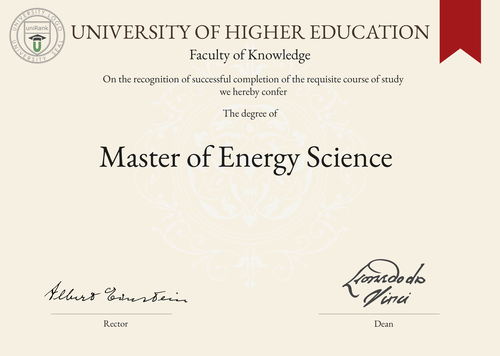
Master of Energy Science (M.E.S.)
Guide to Master of Energy Science Program/Course/Degree
Master of Energy Science (M.E.S.)

Program Name:
Master of Energy ScienceProgram or Degree abbreviation:
M.E.S.Duration range:
Varies by country and university, typically 1-2 yearsTuition range:
Varies by country and university, typically $10,000-$30,000 per yearOverview:
The Master of Energy Science program is designed to provide students with a comprehensive understanding of energy systems, renewable energy technologies, energy management and sustainable practices. This program equips students with the knowledge and skills necessary to address the global energy challenges and contribute to the development of sustainable energy solutions.Curriculum Overview by year:
The curriculum is structured to cover a wide range of topics related to energy science. In the first year, students typically study core courses such as Energy Fundamentals, Energy Policy and Economics, Renewable Energy Technologies and Energy Efficiency. In the second year, students have the opportunity to specialize in areas such as Energy Management, Energy Storage, or Sustainable Energy Systems through elective courses and research projects.Key Components:
The key components of the Master of Energy Science program include a strong foundation in energy science, hands-on experience with renewable energy technologies, understanding of energy policy and economics and the ability to analyze and optimize energy systems.Career Prospects:
Graduates of the Master of Energy Science program can pursue various career paths in the energy sector. They can work as energy consultants, renewable energy project managers, energy analysts, sustainability officers, or researchers in government agencies, energy companies, consulting firms, research institutions and non-profit organizations.Salary Expectations:
Salary expectations for Master of Energy Science graduates vary depending on factors such as job position, location and years of experience. On average, professionals in this field can earn between $60,000 and $100,000 per year.Conclusions:
It is important to note that the duration, tuition fees, curriculum, key components, career prospects and salary expectations of the Master of Energy Science program can vary based on the chosen country or location for studying the program, as well as the chosen university. Visitors interested in pursuing this degree are encouraged to use the uniRank World Universities Search Engine to find institutions offering the Master of Energy Science program worldwide. This will allow them to explore different options and choose the program that best aligns with their goals and preferences.World Universities Search Engine
search for Master of Energy Science (M.E.S.) and add the Location (country, state etc.) or specific University you are interested in studying at.
Query examples:
- Master of Energy Science (M.E.S.) United States
- Master of Energy Science (M.E.S.) United Kingdom online
- Master of Energy Science (M.E.S.) Australia international students
- Master of Energy Science (M.E.S.) University of California
- Master of Energy Science (M.E.S.) University of London tuition fees
- Master of Energy Science (M.E.S.) University of Sydney scholarships
Share Program/Course
Interesting? Share this program/course/degree info with your friends now.